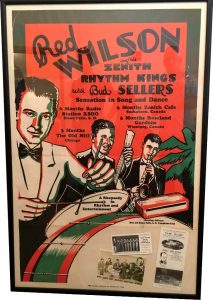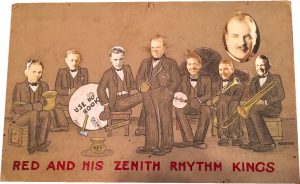I heard about a lot of people I didn’t know when I was a kid, including a number of musicians. George Fritton and the Swing Kings were still performing then, but I was too small to go hear them. Gene Pieper, who lived across the alley, had once had a band and his brother Leo’s band had achieved considerable regional success. I also heard about my grandparents’ old friend, Tru Valier “Red” Wilson, who played in several bands, including his own, through the 20s in into the mid 30s.
Recently Red’s great-great-grandson, Jacob Nore, asked me to help him learn jazz guitar. Jacob, who’s about to start his senior year at Boone Central, mentioned that he was related to Red so I tried to find some examples of jazz from that era for Jacob to listen to. And remembering that Bob Wilson had mentioned his father to me on several occasions, Jacob, my son Thomas and I visited with Bob and his wife Arlene last Saturday to learn more about Red.
Bob and Arlene were gracious hosts and showed us a lot of memorabilia about Red and his bands, including a clever caricature of his Zenith Rhythm Kings band that my great uncle Raymond Hosford had drawn for them long ago.
Red’s first band included Virgil Potter on trumpet and plumber Ivan Johnson on drums, but Red soon left Albion and moved up in the music world, eventually attaining the rank of “King of Clarinet” and “Wizard of Saxophone” (or at least that’s what his publicity material said). Based in Sioux Falls and later in Clear Lake, Iowa (where he also owned a lodge), Red toured the Midwest and parts of Canada and in 1931 took part in a highly publicized “Battle of the Bands” that offered a then-substantial $125 prize. His band performed on the radio every other Saturday night, alternating with Lawrence Welk, and Bob thinks his dad was the better musician. Red might well have become as famous as Lawrence if he’d been able to stay in music. But the Great Depression spelled doom for a lot of bands, and Red’s was one of them.
Red and his wife Lettie returned to Albion in 1935 and together ran a liquor store for decades. Though he occasionally sat in with the Swing Kings, Red pretty much quit playing when he moved back here. Though once regionally famous, I don’t suppose very many people remember Red and his Zenith Rhythm Kings today. But if anyone reading this does – or has stories about other musicians from this area’s past — please give me a call or send me a note. I love hearing these stories and hopefully I can share more of them in the future.


Though few people seem to remember him, John W. Gardner was a leader in 20th Century political, social and economic thought. In addition to things like founding Common Cause and serving as Secretary of Health, Education and Welfare under President Lyndon Johnson, Gardner wrote many books, including one entitled Self-Renewal. In this book, published in 1963, Gardner explained that society can renew itself only by embracing flexibility, diversity and creativity.
Reading this book today reveals Gardner to have been remarkably prescient – he seemed to have foreseen, among other things, the need for a highly educated workforce and the explosion of the tech sector. He was a staunch advocate of life-long education and embracing new technologies. He also warned about the dangers of monolithic thinking, excessive focus on individualism and politicians offering feel good solutions to complex challenges, things he saw as detrimental to freedom and growth.
Freedom was central to Gardner’s thinking (influenced no doubt by his era’s struggle against communism), and he pointed out that freedom “is the existence of alternatives or choices. A society or organization is coercive to the extent that the individual has no alternatives…” Gardner noted that in “a pluralistic society… there is a willingness to entertain diverse views rather than one ‘official’ doctrine.”
Gardner went on to observe that “The man in the street thinks freedom, like sunshine or fresh air, is always there to be had if someone isn’t forcibly preventing him from enjoying it. But freedom as we know it has been exceedingly rare in the history of mankind. It is a highly perishable product of civilization, wholly dependent on certain institutional arrangements [the government and justice systems] widely agreed upon. This is worth saying because moderns are so enamored of the idea of individuality that they imagine the only effect a society can have on an individual is a destructive one. But it is by means of the free society that men keep themselves free.”
It isn’t hard to imagine what Gardner would think of things today. In his time the two political parties embraced a far greater range of diverse viewpoints than we find today. Though they differed in important ways, Republicans and Democrats agreed on many fundamental points, including the importance of freedom and the positive role government plays in preserving it.
Today, though, diversity of opinion – especially on the far Right – is considered treason. There is “one ‘official’ doctrine,” as Gardner warned against, and compromise is today unthinkable (just ask John Boehner).
The Right has fallen prey to another idea Gardner warned against, believing that society – and its principle manifestation, democratic government – is a destructive force. Yes, government restricts individuals from doing certain things but these restrictions are imposed to protect freedom and safeguard the rights and well-being of the many.
Gardner would be particularly alarmed by the rhetoric of Republican presidential candidate Donald Trump. In writing about tyrants (and Trump is nothing if not tyrannical), Gardner observed, “We still think of the typical dictator as one who flouts the wishes of the people, but the truly modern dictator achieves his goals through the people, not in spite of them. He manipulates their hopes and fears and is ushered into office with their joyous shouts.” In embracing Trump, a master at appealing to the worst in people, Trump’s supporters are eager to abolish a number of traditional American freedoms.
Gardner has rightly been called a hero for his positive influence on America, and his warning about the threats to our freedom ring truer today than in his time — we ignore his wisdom at our peril.

